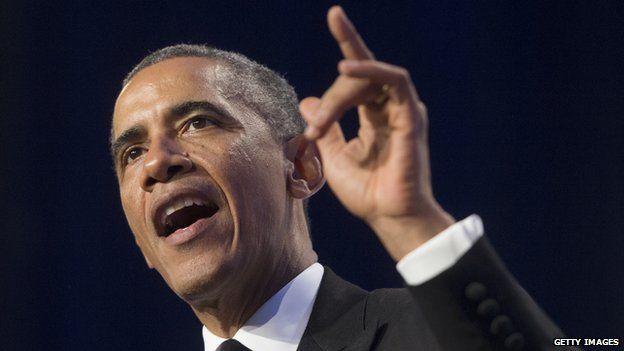Charismatic speakers 'manipulate their vocal frequency'
- Published

Scientists say they now understand what makes a voice sound charismatic.
Some people have an innate ability to manipulate their vocal frequency to give their voice a richer quality, the US-based researchers said.
Such people can then apply additional vocal techniques to take advantage of this.
The researchers also found that political leaders with lower voices were perceived as more dominant and attractive.
Conversely, those who spoke with higher frequencies were viewed as submissive and benevolent. These findings are in line with previous research.
Participants listened to many different versions of politicians voices, as featured in this audio
Controlling vocal frequency is an innate ability dependent on the size of a person's larynx.
A large larynx and long vocal fold result in a lower voice vibration. In a similar way, the same musical note will sound different played on a cello and a violin.
'Emotional state'
Leaders have the ability to manipulate their voices in order to be recognised as dominant figures, said Rosario Signorello at the University of California, Los Angeles (UCLA), who led the research.
"The internal characteristics of a dynamic or charming leader are always perceived through voice. Leaders use a charismatic voice to arouse an emotional state in their listeners," he told the BBC.
The common feature of a charismatic leader is their ability to manipulate their vocal quality in order to convey different types of charisma. In political speeches this can help persuade audiences, he said.
Speakers perceived as charismatic add inflection, harshness or other characteristics to align with their audience's expectation.
"This function is learned, dependent on the languages that we speak and filtered by the culture one belongs to," said Dr Signorello.
Conveying sexiness
In the research, Dr Signorello changed the frequency of male politicians' voices from Italy, France, Portugal and Brazil, including Luigi de Magistris, Francois Hollande and Luiz Inacio Lula da Silva.
More than 250 participants in his research were then asked to rate the voices with 67 adjectives such as dishonest, scary, dynamic, attractive, convincing and fair.
The perception of a speaker was also based upon cultural preferences and the language spoken.
For example, French participants preferred a politician with a medium vocal pitch, perceiving him as prudent, calm, trustworthy and fair. Italian participants preferred a lower pitch, viewed as authoritarian, determined and menacing.
But changing one's voice to become more charismatic is not simple. Aside from one important aspect of it being innate, Dr Signorello said it also depended what type of charisma a person was seeking to portray.
"Lowering the vocal pitch, or fundamental frequency, can help to convey dominance but also sexiness. And adding a harsh voice can help [you] to be perceived as a threat or as sexy.
Excited
"A male with a low, deep voice would be perceived as dominant by other males but maybe as sexy by females. In contrast a higher vocal pitch can convey submission (male speaker, male listeners) or sexiness (female speaker, male listeners).
"So there is no general recipe for being charismatic but in every culture there are ways to manipulate your voice to convey different types of charisma."
The research from UCLA's Bureau of Glottal Affairs was presented at the 168th Meeting of the Acoustical Society of America.
Jan Schnupp, co-director of Oxford University's auditory neuroscience group said the work was interesting and fun. "Intuitively the research makes a lot of sense to me. Normally, larger people have larger, heavier vocal folds which vibrate more slowly, and therefore produce a lower fundamental frequency.
"So we associate deep voices with an impressively large physique. However, how fast your vocal folds vibrate also depends on how much muscle tension you apply in your larynx. Often muscle tone increases, and hence voice pitch rises simply when people get excited."
- Published14 June 2013
- Published8 April 2013
- Published14 November 2011